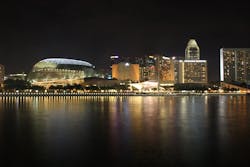Singapore Leads World in Water Recycling
The tiny island nation of Singapore, despite minimal natural water sources, has become the world’s leader in water recycling. With the world experiencing global drought, rapid population growth and widespread fresh water shortages, there is much to be learned from the “Singapore Model.”
Those were the conclusions of Circle of Blue spokesperson Brett Walton, in an interview on the Sharon Kleyne Hour Power of Water radio show. Circle of Blue is a Traverse City, Mich., based organization bringing together journalists, scientists and designers to compile and distribute information about global water resources.
According to Walton, because of the Singapore’s farsighted water strategy, the nation is well on the way to achieving water independence for its 5 million inhabitants—despite a land area of only 272 sq miles and the world’s second densest population (after Monaco and just before Hong King).
Singapore formerly obtained 50% of its water from nearby Malaysia. Because of the success of the current water strategy, the country did not renew a 50-year water contract with Malaysia that expired in 2011 (after failed negotiations in 2002). Singapore projects 100% water independence by 2061, when a separate 99-year water contract with Malaysia expires, even though demand will have doubled by then.
Kleyne, a longtime water recycling advocate, believes that every government on Earth should be excited about Singapore’s water accomplishments. According to Kleyne, 1.3 billion of Earth’s 7 billion people lack access to safe and sufficient drinking water and suffer disease and mortality as a result. Even where the water supply is adequate, it is often transported for hundreds of miles at great expense. Many existing water sources worldwide are no longer adequate.
The Singapore water model has three components:
- 1. Improved rainwater catchment
- 2. Desalination of seawater
- 3. Water recycling
Kleyne and Walton agreed that water conservation—persuading the public to use less—is critical to any water recycling program. According to Walton, Singapore is one of the most water conserving and water conscious cities in the world.
While there is much to be learned from Singapore, the U.S. and Australian water distribution models are also being adapted elsewhere in the world, especially in China and India. According to Kleyne, the global leaders in desalination are Israel, Singapore, Saudi Arabia, Australia and the U.S. states of California, Florida and Texas.
Click here for more information.
Source: Circle of Blue
